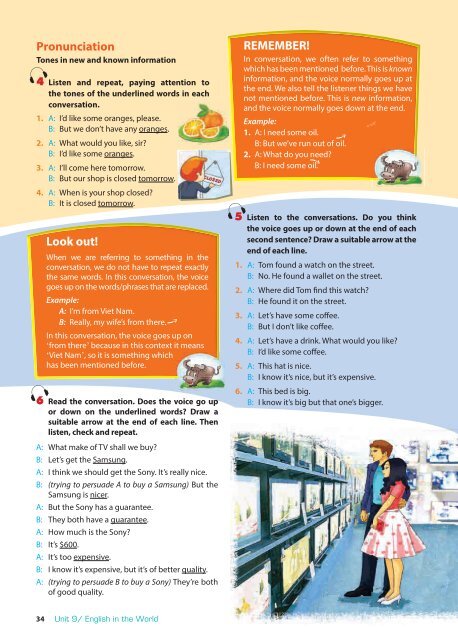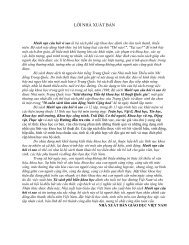Sách giáo viên Tiếng Anh 9 Thí điểm 2 tập (Pilot English 9 for Teacher)
https://app.box.com/s/rnv2yu1duebjhdpkknu2l47p9nmel5ax
https://app.box.com/s/rnv2yu1duebjhdpkknu2l47p9nmel5ax
Create successful ePaper yourself
Turn your PDF publications into a flip-book with our unique Google optimized e-Paper software.
Pronunciation<br />
Tones in new and known in<strong>for</strong>mation<br />
4 Listen and repeat, paying attention to<br />
the tones of the underlined words in each<br />
conversation.<br />
1. A: I’d like some oranges, please.<br />
B: But we don’t have any oranges.<br />
2. A: What would you like, sir?<br />
B: I’d like some oranges.<br />
3. A: I’ll come here tomorrow.<br />
B: But our shop is closed tomorrow.<br />
4. A: When is your shop closed?<br />
B: It is closed tomorrow.<br />
Look out!<br />
When we are referring to something in the<br />
conversation, we do not have to repeat exactly<br />
the same words. In this conversation, the voice<br />
goes up on the words/phrases that are replaced.<br />
Example:<br />
A: I’m from Viet Nam.<br />
B: Really, my wife’s from there.<br />
In this conversation, the voice goes up on<br />
‘from there’ because in this context it means<br />
‘Viet Nam’, so it is something which<br />
has been mentioned be<strong>for</strong>e.<br />
6 Read the conversation. Does the voice go up<br />
or down on the underlined words? Draw a<br />
suitable arrow at the end of each line. Then<br />
listen, check and repeat.<br />
REMEMBER!<br />
In conversation, we often refer to something<br />
which has been mentioned be<strong>for</strong>e. This is known<br />
in<strong>for</strong>mation, and the voice normally goes up at<br />
the end. We also tell the listener things we have<br />
not mentioned be<strong>for</strong>e. This is new in<strong>for</strong>mation,<br />
and the voice normally goes down at the end.<br />
Example:<br />
1. A: I need some oil.<br />
B: But we’ve run out of oil.<br />
2. A: What do you need?<br />
B: I need some oil.<br />
5 Listen to the conversations. Do you think<br />
the voice goes up or down at the end of each<br />
second sentence? Draw a suitable arrow at the<br />
end of each line.<br />
1. A: Tom found a watch on the street.<br />
B: No. He found a wallet on the street.<br />
2. A: Where did Tom find this watch?<br />
B: He found it on the street.<br />
3. A: Let’s have some coffee.<br />
B: But I don’t like coffee.<br />
4. A: Let’s have a drink. What would you like?<br />
B: I’d like some coffee.<br />
5. A: This hat is nice.<br />
B: I know it’s nice, but it’s expensive.<br />
6. A: This bed is big.<br />
B: I know it’s big but that one’s bigger.<br />
A: What make of TV shall we buy?<br />
B: Let’s get the Samsung.<br />
A: I think we should get the Sony. It’s really nice.<br />
B: (trying to persuade A to buy a Samsung) But the<br />
Samsung is nicer.<br />
A: But the Sony has a guarantee.<br />
B: They both have a guarantee.<br />
A: How much is the Sony?<br />
B: It’s $600.<br />
A: It’s too expensive.<br />
B: I know it’s expensive, but it’s of better quality.<br />
A: (trying to persuade B to buy a Sony) They’re both<br />
of good quality.<br />
34 Unit 9/ <strong>English</strong> in the World

















